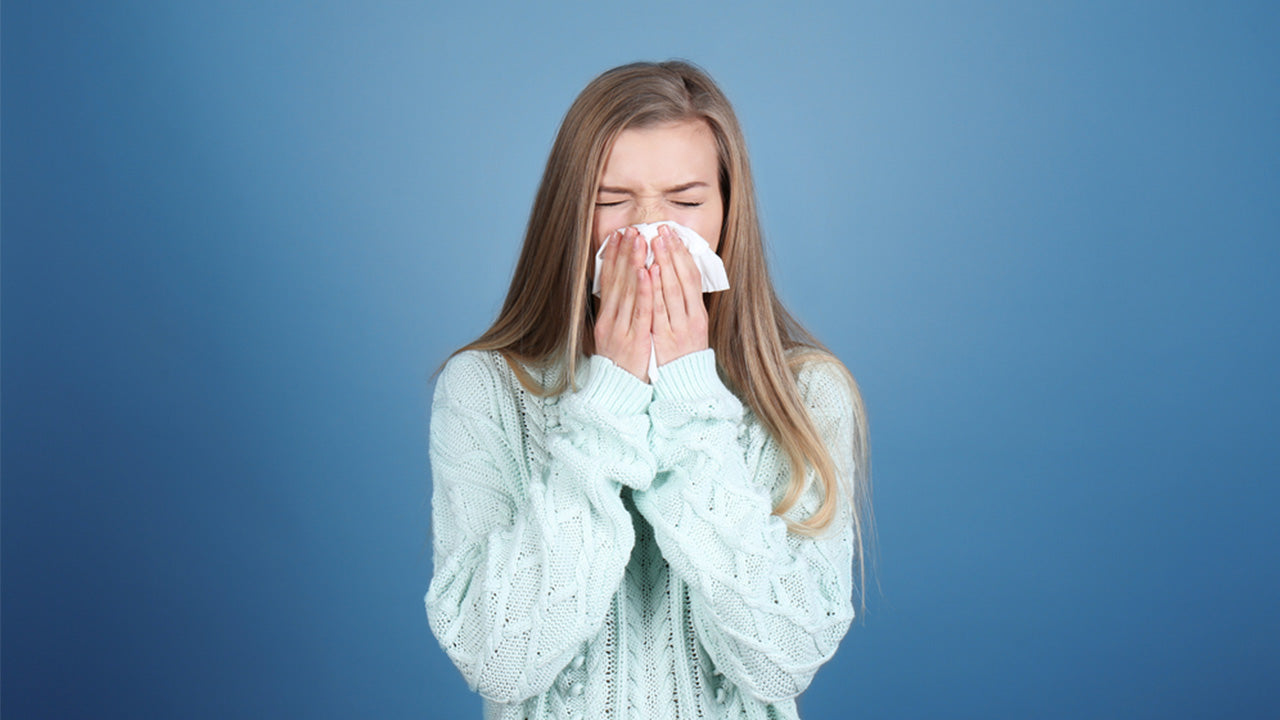Upper Respiratory Infection: Symptoms to Look out For, Types to Know and Treatments to Try
 By: by Amino Science
By: by Amino Science

Wondering if you’ve ever had an upper respiratory infection (URI)? If you’ve suffered from the common cold, then the answer is almost certainly yes. According to Johns Hopkins University, this illness is one of the most common in adults and children, with the latter enduring up to eight colds each year.
While most healthy individuals recover from upper respiratory infections within a week or two of getting sick, the condition can be more dangerous in young children, older adults, and those with compromised immune systems. Because an acute upper respiratory infection can impede normal breathing, people with certain immune system disorders may need to see their doctors for care in the event they get sick.
Upper Respiratory Causes
Over 200 different viruses can cause a URI. The most common culprits include:
- Rhinovirus
- Corona virus
- Parainfluenza virus
- Adenovirus
- Enterovirus
- Respiratory syncytial virus
These viruses affect the nasal passages and throat and bring on common cold symptoms, such as the classic runny nose, sneezing, and cough.
Upper Respiratory Infection Symptoms
Wondering if you or a loved one is suffering from an upper respiratory tract infection? Stay alert to the following common symptoms:
- Cough
- Nasal congestion, including discharge, sneezing, and runny nose
- Low-grade fever
- Body aches
- Watery eyes
- Sore or scratchy throat
Occasionally, patients may suffer from more severe symptoms, including fever and chills, breathing problems, dizziness, and even fainting or loss of consciousness. If you or a family member experiences these serious cold symptoms, don’t hesitate to seek medical attention.
Types of URIs
While the common cold is one of the most frequently contracted upper respiratory infections, there are other forms of this condition. Below are some of the other upper respiratory tract infections out there, along with symptoms to help identify them.

Flu
Also known as influenza, the flu is a potentially serious respiratory infection resulting from viruses that attack the nose, throat, and lungs. Common flu symptoms include fever, chills, severe fatigue, and cough.
While healthy people tend to recover from the flu in a few days, the condition can be serious in babies and small children, women who are pregnant, and adults over 65, along with anyone who has a compromised immune system. Individuals in the latter groups should not hesitate to seek medical attention if they feel ill, as the flu can turn into a more serious condition such as pneumonia or another lower respiratory infection affecting the lungs.
Sinusitis
Referring to a condition in which the sinuses become inflamed, sinusitis is a sinus infection that may result in sneezing, nasal congestion and discharge, fatigue, and facial tenderness.
Epiglottitis
Resulting from inflammation of the epiglottis, or the upper part of your trachea, this type of infection can cause blocked airways, a sore or irritated throat, and coughing. Fever is also a common side effect of this illness and one that should be monitored.
Laryngitis
Laryngitis, or inflammation of the larynx or voice box, can be caused by vocal strain or a viral infection. Along with a weak or absent voice, laryngitis sufferers may experience dry throat and coughing. Typically, sufferers regain the ability to speak within a week or so.
Tonsillitis
Caused by either a viral infection or bacterial infection of the tonsils, tonsillitis results in inflammation, pain in the throat and ears, loss of voice, and headache. Some patients also suffer a fever. In rare cases, doctors may opt to remove the tonsils surgically to prevent recurrence.
Bronchitis
A common upper respiratory infection, bronchitis stems from inflammation in the bronchial tubes. Along with traditional cold symptoms, like sneezing and sore throat, individuals may suffer wheezing, back and muscle aches, and a low fever.
Diagnosing Upper Respiratory Tract Infection
Obtaining a diagnosis for an upper respiratory tract infection is usually simple. When you visit your doctor, he or she will likely take a medical history and conduct a physical exam. Your healthcare provider may also perform a throat swab to rule out strep and take chest x-rays to check for more serious conditions like pneumonia. While most upper respiratory infections resolve on their own within a couple weeks, others require treatment to expedite recovery and prevent patients from passing the illness to others.
Upper Respiratory Treatments
Because doctors have yet to discover a cure for the common cold, it’s best to avoid catching an upper respiratory infection in the first place. Colds spread through direct contact with infected persons or through the air when an infected person coughs or sneezes. You can reduce your odds of contracting one of these common illnesses by washing your hands frequently, especially during cold and flu season, and using an alcohol-based hand sanitizer while on the go. Additionally, individuals should avoid close contact with people who are sick, and take steps to ensure proper rest and nutrition.
If you’ve already contracted a cold, you can avoid spreading it to others by covering your face while coughing and sneezing and washing hands frequently. You can expedite recovery and ease symptoms by getting plenty of rest and increasing fluid intake. Over-the-counter NSAIDs can help alleviate muscle aches, cold medicine and cough suppressants can help you sleep, and nasal decongestants like saline nasal sprays or Neti pots can help you breathe easier.
To help reduce the likelihood of catching a URI or to shorten the duration of symptoms consider using some of Mother Nature's natural URI fighters, like:
- Zinc
- Vitamin C
- Oregano oil
- Echinacea
- Salt water gargle
If your symptoms are severe or if you don’t start to feel better within 7 to 10 days, you should consider seeing your doctor. In some cases, antibiotics are needed to treat more stubborn upper respiratory infections that are bacterial in nature.
Essential Amino Acids and Recovery
The absence of a pill to cure an upper respiratory infection means that you have to rely on your own physiology to get well. Your immune system must be functioning at peak performance. Optimal nutritional intake is the best way to support your immune function. However, if you are sick, you probably don’t feel like eating, and this lack of appetite is likely to compound your problems.
When you are sick and battling an upper respiratory infection, it is particularly important to maintain your intake of essential amino acids, as these are the key components of the diet that support the synthesis of new proteins. You’ll want to fortify your health with a variety of high-quality protein food sources, including fish, eggs, meat, and dairy products. In addition, a dietary supplement of essential amino acids will help ensure an adequate intake of these vital nutrients, particularly if you find it difficult to eat the amount of protein required for optimal immune function.

Up to 25% off Amino
Shop NowTAGS: conditions natural cures
Join the Community
Comments (0)
Most Craveable Recipes




 833-264-6620
833-264-6620



















